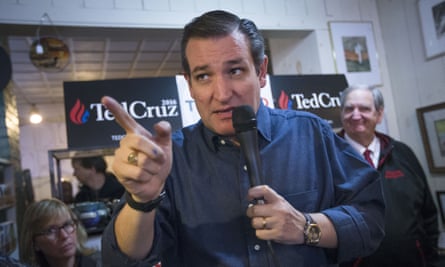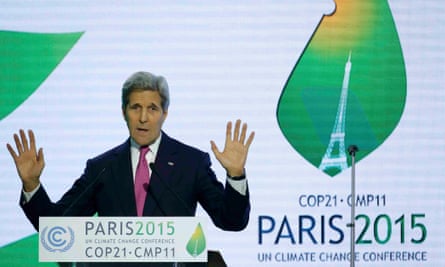They have bloviated about carpet bombing, bickered about walls, and waxed anti-Muslim and -migrant, but over more than 16 hours of debate, the Republican candidates for president have almost entirely ignored what most of the world fears most: the rising tides and temperatures of climate change.
Last week, Fox News moderators asked only one question relevant to climate change, about whether Florida senator Marco Rubio would support regulation to lower emissions. Rubio said he would not: “I do not believe that we have to destroy our economy in order to protect our environment.”
On the trail, former Florida governor Jeb Bush interjected to say the free market would resolve climate change before government could.
“There’s someone in a garage somewhere,” he said, “parochially I hope it’s in Miami, that’s going to have a clue, to have an answer to this.”
Miami will settle for anyone doing something – so long as it’s before environmental changes driven by humans destroy the city’s economy. Late last week, Mayor Tomás Regalado joined 14 other south Florida mayors in signing an open letter to Rubio, asking him to give up his opposition to climate change action.
The low-lying city and its nearby resorts and islands suffer near annual floods from rising sea levels, costing the city hundreds of millions. The mayors warned that a 1ft increase in sea level could “wipe out as much as $4bn” in real estate, and 3ft could cost $31bn and swallow large sections of the Florida Keys and greater Miami area.
“We need a realistic national plan to slow global warming emissions and avoid the worst impacts of climate change,” the mayors wrote. “The science is well established: protecting the long-term future of our cities must include preventing global temperatures from rising.”
One of the signatories, South Miami mayor Philip Stoddard, was more blunt a few years before Rubio’s presidential bid.
“Rubio is an idiot,” he told the Guardian at the time. “He says he is not a scientist so he doesn’t have a view about climate change and sea-level rise and so won’t do anything about it.”
Rubio’s professed ignorance has shifted to skepticism – a sign that many Republicans have reluctantly accepted that the issue exists for voters, if not that the issue matters. Last year, Rubio and two of his rivals, senators Ted Cruz and Rand Paul, agreed in a symbolic vote that climate change is “is real and not a hoax”. Of the three, only Paul voted to agree that human activity causes global warming.
None have agreed that climate change exacerbates threats to national security and the economy, although the point is agreed on by Pentagon officials, Nasa scientists, foreign policy experts, dozens of Republican and Democratic leaders, international researchers and the pope.
The candidates might be playing simple politics – no one wants to be seen agreeing with Barack Obama or Bernie Sanders or Hillary Clinton, who called climate denial a “charade” on Sunday night – but they have also tried out several arguments to discredit the dangers and science of climate change.
What ‘global warming alarmists don’t want to talk about’

That not all data indicates constant warming is one of the preferred arguments of Ted Cruz, who held a Senate hearing last month titled Data or Dogma.
To testify, Cruz called a retired Princeton physicist who believes the planet needs more carbon dioxide; a controversial climate scientist convinced of corruption in the Intergovernmental Panel on Climate Change (IPCC); a climate scientist who insists basic models need reinvention; and a Canadian jazz vocalist who frequents the Rush Limbaugh Show and recorded an album about cats.
With the help of his witnesses and RSS satellite data since 1998, Cruz argued: “There has been no significant global warming for the past 18 years.”
But the senator chose a very specific set of data: an extraordinary El Niño set record temperatures in 1998, and by the RSS metric global warming has slowed in the 18 years since. The result was a chart that began with a peak and spanned not quite two decades of slow warming.
Carl Mears, the senior research scientist whose data Cruz used, told the Guardian that Cruz was guilty of the crime with which he charges scientists: presenting a very partial argument.
“He ignores other time periods, and other types of data,” said Mears, stressing surface temperatures “that do not support his hypothesis. He asserts that the satellite temperatures are more accurate than the surface temperature without providing any supporting evidence.”
Despite his own work with satellite data sets, Mears said he suspects surface data sets are more accurate.
“I agree with Mr Cruz that policy should follow science and data,” he said. “But it is important to follow all the data, not just the part that supports one side of the argument.”
A partial picture
Rubio has also spoken of the “hiatus”, which Mears and others are studying and which remains only part of the picture. Last year was the hottest on record by far, smashing a record set only a year earlier.
A witness called by Democrats to Cruz’s Senate hearing, David Titley, a Penn State meteorologist and former navy admiral, rebuffed Cruz. Titley noted that science by definition contains error and revision – demonstrated, for instance, by the corrections made to satellite data produced by his fellow witnesses.
He also showed a clear curve of rising temperatures and carbon dioxide levels since 1880.
“There are plenty of other signs that are far less equivocal, and perhaps even more relevant to those of us who live on the Earth’s surface,” he said. “Land and ocean surface temperatures are increasing, sea ice is declining, glaciers are shrinking, oceans are rising, the list goes on.”
Cruz mentioned a ship that got stuck in ice around Antarctica, arguing that the polar ice caps are not melting.
Charles Bentley, an expert on Antarctica at the University of Wisconsin-Madison, told the Guardian that sea ice floats.
“If someone says sea ice in the same sentence as related to sea level change, a red flag goes up.”
Bentley called the argument “a little bit misleading”, because sea ice, although an indirect sign of change around the poles, “doesn’t directly indicate anything”. Cruz’s argument also ignores the clear melting of ice and glaciers on and around the north pole, where Russia, Canada and the US are competing over newly open ocean.
‘Destroying the economy’

Rubio and Cruz have both said they would pull the US out of the historic Paris climate accords, and with Bush and New Jersey governor Chris Christie said they oppose any measures that would “destroy” the economy or stifle business. Donald Trump, Bush and John Kasich have mocked the Paris summit as an unnecessary diversion.
If the US withdrew from the Paris deal, it would join North Korea, Syria, Libya and Venezuela among the handful of nations who refuse to sign.
The aversion to all regulation is a major departure from the policies of Republicans past. Richard Nixon created the Environmental Protection Agency, Ronald Reagan’s staff invented the cap and trade system, George HW Bush signed the Clean Air Act and Teddy Roosevelt protected 230m acres of land.
But the candidates have largely agreed with Rubio, who in a debate said: “We are not going to destroy our economy, make America a harder place to create jobs, in order to pursue a policy that will do nothing, nothing to change our climate.”
How climate change action might affect the economy depends on the measures involved; most of those proposed affect the worst emissions producers, such as coal – an industry in decline in the US for decades.
In 2014, about 67% of electricity generated in the US was from fossil fuels, according to the EIA, though oil only accounted for 1%. The US natural gas industry faces more pressure from cheap Opec oil than investment in renewable energy.
But in 2011, before the industry was rocked by low oil prices, the five main fossil fuel industries still accounted for less than 2% of all US non-agricultural employment.
Doing nothing also has its consequences, as south Florida businesses have tried to remind Republicans. By exacerbating flooding, water and energy crises and mass migration, climate change threatens to devastate the world economy – US gas industry included – according to a survey of 750 economists, conducted last year.
Economists at Stanford and UC Berkeley also published a study last year that found rising temperatures will likely exacerbate inequality.

Comments (…)
Sign in or create your Guardian account to join the discussion